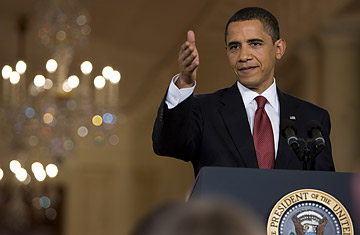
President Barack Obama speaks during a press conference in the White House on March 24, 2009
The first rule of the political press conference: You don't really have to answer the question, or at least you don't have to dwell on it. You can simply say what you came to say. This is even more true when you are a popular President of the United States. So at the end of an otherwise drab and detailed jousting with the White House press corps Tuesday over policy projections and financial problems, Barack Obama seized his opportunity.
The last question was an East Room evergreen: Did the President have confidence in his ability to forge peace between Israel and the Palestinians? The answer was predictable too. Yes, said Obama, but it would be hard, and recent elections in Israel had made it harder. But then he continued on to where he had always intended to go. "If you are persistent, then these problems can be dealt with," Obama said. "That whole philosophy of persistence, by the way, is one that I'm going to be emphasizing again and again in the months and years to come as long as I'm in this office."
And then he was off. He would be persistent, he said, about passing a budget that addressed his concerns about energy, health care and education. He would be persistent about finding a way to solve the credit crisis, persistent about finding a way to take on lobbyists and pork spending, and persistent about finding new ways of working with Iran. "We are going to stay with it as long as I'm in office," he promised the American people, reminding them yet again that he has only been in office just over 60 days and is wrestling with problems he "inherited." "This is a big ocean liner. It's not a speedboat." (See Obama's top 10 gaffes.)
So the message was delivered — though it was, one must say, a big shift from the last time Obama messed up the prime-time television schedule for a press conference. Six weeks ago, he had a different message: The nation was facing a financial abyss, he explained, and lots had to be done, and fast, to prevent a prolonged economic catastrophe. Now he had returned to the same format to say that that the ship was slowly turning and the problems would be solved. Teachers and police officers were keeping their jobs, he said in his introduction, reading from a large TV screen. Stimulus tax cuts were finding their way into paychecks. Mortgage interest rates were at historic lows. A credit-crunch solution was in the pipeline. "So let's look towards the future with a renewed sense of common purpose, a renewed determination, and most importantly, a renewed confidence that a better day will come," Obama said.
As is often the case with Obama, his macro message was buffeted by hard-nosed political tactics just beneath the surface. He made the rather remarkable claim, for instance, that his budget proposal was "inseparable from this recovery," apparently tying his own long-range policy goals on education, energy and health care to the end of the current recession. He also took some jabs at his Republican critics, who have mostly been marginalized in recent weeks by a lack of substantive arguments. "The critics tend to criticize, but they don't offer an alternative budget," he said, sounding exasperated.
Though he spoke of the cooperation of the world's nations in addressing the credit crisis, Obama also applied some pointed pressure on major economic powers, including nations in Europe and Asia, that have yet to commit to sizable stimulus programs. "We don't want a situation in which some countries are making extraordinary efforts and other countries aren't, with the hope that somehow the countries that are making those steps lift everybody up," he said.
The President also showed his own ability to play a bit of hardball. When a reporter raised the issue of Obama's greatest public-relations bungle to date — the delayed response to news of impending bonuses at the insurance giant AIG — Obama made it clear he was not interested in discussing the matter at length. "I like to know what I'm talking about before I speak," he said, explaining the delay in making the information public and expressing outrage. Then he moved on while the reporter, CNN's Ed Henry, tried without success to get him to elaborate. (Read "The AIG Backlash: Has Congress Flipped Out?")
The rest of the event mostly covered matters that had already been handled. He defended his budget in the face of the extraordinary deficits it would produce under economic projections by the Congressional Budget Office, projections the White House believes are overly pessimistic. He described his decision to fund expanded stem-cell research as a difficult ethical one. He said that aside from some of the understandable elation around his Inauguration, he did not believe that his race had figured much in his first 64 days in office.
But all these finer points will not matter in the end. Over the past week, Obama has barnstormed the nation's televisions, with repeated town halls in California, a seat on Jay Leno's couch, a big 60 Minutes splash on Sunday, and now a prime-time press conference. Even those who eschew politics have most likely seen a clip or two of their President in charge, projecting confidence, explaining that things will get better. And for the White House, that is the message that matters.
